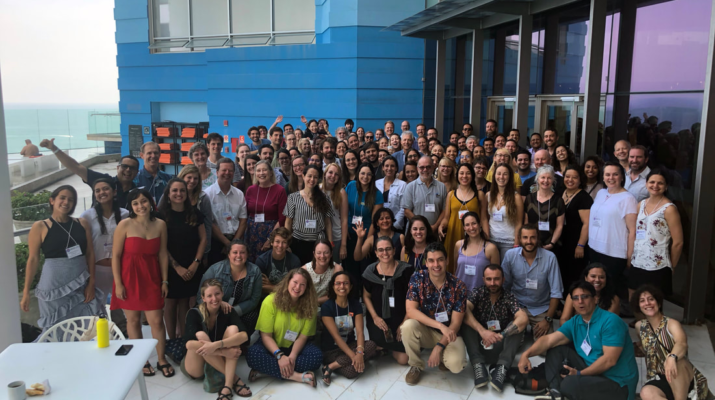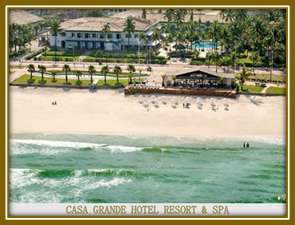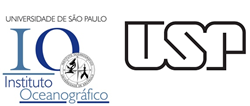Dear Deep-Sea Biology Colleagues,
I am very happy to write to you all from a cold and frosty London, a city which seems to change remarkably little from year to year despite the increasing machinations of its politicians. Perhaps this is a reflection that leadership can have less impact than one might think versus the power of the collective. This has perhaps been a relative quiet 6 months for the leadership of the Deep-Sea Biology Society, as we start to build on the extensive efforts over the past 3 years to establish the Society in its new legal framework with a sound financial model. However, there are some important things to announce and report on, which you can read about in the following sections. One important point to note is that the Society was set-up for you – the deep-sea biology community – and the Trustees are always very keen to hear from the membership any feedback on our activities and suggestions for the future. There are now dsbsoc.org email addresses for all the Trustees, please do get in touch.
2020 is an important year for the Society as we will complete the work of the start-up grant we received from the Lounsbery Foundation, and move to a new financial model. Our regular annual income will now come entirely from our membership fees, donations and surplus from conferences, which is entirely re-invested in the community through our awards and grants. With the rise in our membership, and two successful meetings behind us (that both generated a small surplus) we are pleased to be able to offer almost the same funding for Awards in 2020 as in previous years (when they were supported by Lounsbery). We are also actively seeking new development funds to support our activities. With our focus on supporting early-careers, students and scientists from developing nations, coupled with a well-organised system of efficient, transparent and accountable system of funding awards we are attractive to organisations or donors that wish to donate even small amounts of funding, e.g to give students career-changing conference opportunities. With our network of Trustees operating on a voluntary basis, we can also distribute funds without any overhead costs, unlike large institutions.
Our Annual General Meeting (AGM) for 2020 will be held alongside the 7th International Symposium on Chemosynthesis-Based Ecosystems (CBE7), which will be held in Guarujá, Brazil between 23-28 August 2020. As usual, the AGM will be held on the Wednesday evening of the Symposium, and is an opportunity for all Members to come along and contribute to discussions on the future support of our discipline as well as a nice networking event. CBE7 is sure to be a fantastic conference in a great venue, so please do register as soon as the registrations open, which is currently planned for January. Keep an eye on your emails for news on this.
I am also delighted to formally confirm the dates for the 16th Deep-Sea Biology Symposium which will be held in Shizuoka City, Japan from 8-12 November 2021. This is our major tri-ennial conference and will be the first time it has been held in Asia. The meeting is supported by the Japan Agency for Marine-Earth Science and Technology (JAMSTEC) and the chair of the Local Organising Committee is Dr Katsunori Fujikura. Serving on the Trustees of the Society as Officer for the conference is Dr Moriaki Yasuhara. This is sure to be a fantastic symposium so please hold those dates in your diaries.
There is currently an opening on the board of Trustees of the Society for a new Student Officer. If you are interested in taking on this role, please contact our Secretary Erin Easton on secretary@dsbsoc.org by the 6th of January 2019. Each nomination should include the candidate’s written agreement (email is acceptable) for nomination and a short statement (less than 200 words) describing their interest in the position. A short description of the role can be found on the Society’s constitution, pg. 13. I would like to thank Zoleka Filander for her hard work on this role over the last year and wish her all the best in her future research.
In the Society news below, you can read more about our Meetings, Awards, Student activities, Early-career activities, Mentoring, Communications, Membership and Finances. For now I am very happy to wish everyone a very happy holiday season and best wishes for the New Year.
Adrian Glover, President
Meetings
Report on the 7th International Symposium on Deep-Sea Corals
Santiago Herrera, Memberships Officer, membership@dsbsoc.org
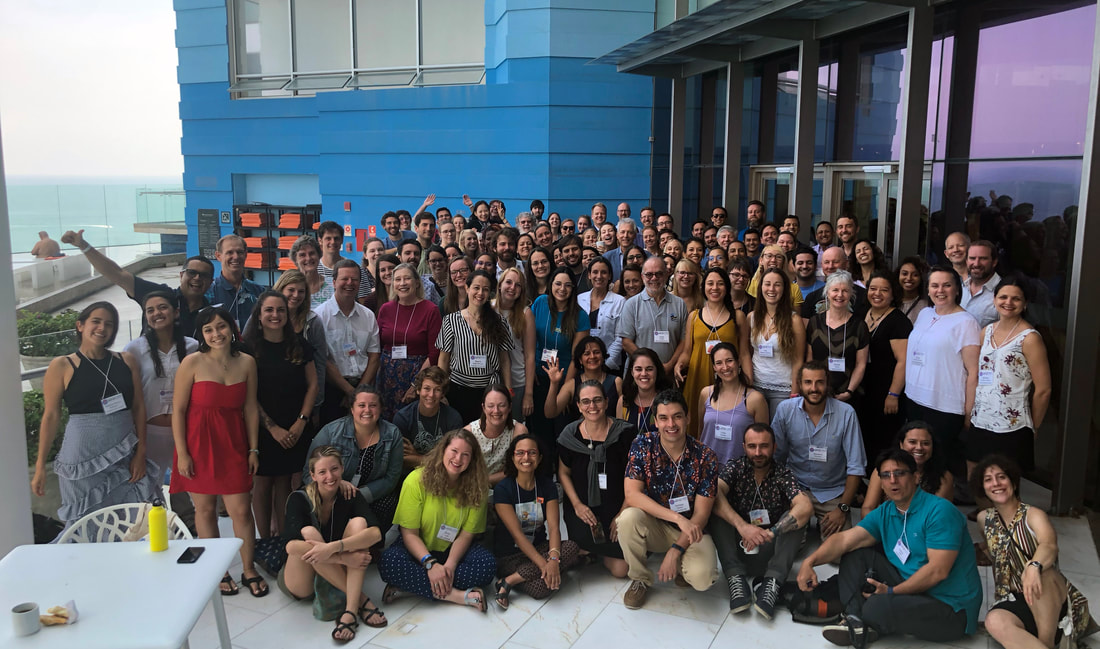
The 7th International Symposium on Deep-Sea Corals (ISDSC7) took place at the Intercontinental Hotel in Cartagena de Indias, Colombia, between July 29 – August 2, 2019. The symposium had 169 attendees, representing more than 23 countries. The latest advances in deep-sea coral and sponge science and management worldwide were presented in 81 talks and 66 posters. The abstracts and program for the conference are available at https://deepseacoral2019.weebly.com/program.html. Lunches, snacks, drinks, a banquet, and on-site child care services were available for symposium participants at no extra cost.
This was the first time that the symposium was organized with support from the Deep-Sea Biology Society. Santiago Herrera from Lehigh University, the DSBS membership officer,, was also the lead organizer of the symposium. Juan Sanchez from the Universidad de los Andes, and Luisa Dueñas from the Universidad Nacional de Colombia, were the co-organizers. The entire Society leadership was also involved facilitating logistics and leading activities during the meeting. This work included the management of finances and contracts, coordination and execution of Society side-events, management and evaluation of student and early-career awards, development of software and technology for program organization and management of sessions, in addition to individual intellectual contributions.
In total, 20 travel awards were made to participants in need by the Society in collaboration with organizers and sponsors. Overall, more than 20% of the participants received some form of financial assistance from the Society or the organizing committee. The Society held its AGM, as well as student and early-career events sponsored by the Society. The Society also presented awards to the best student and early-career talks and posters. Thanks to the several sponsoring organizations, the symposium ended with a positive net economic balance. All of this balance was given by the organizers to the Society with the intent of supporting future community-led meetings and activities.
7th International Symposium on Chemosynthesis-Based Ecosystems (CBE7)
23-28 August 2020, Brazil https://www.cbe7.com/
Dear Lovers of Chemosynthesis-Related Science,
We would like to remind you that the 7th International Symposium on Chemosynthesis-Based Ecosystems (CBE7) will be held between 23-28 August 2020 in Brazil. CBE7 represents the 7th iteration of a successful symposium series, that has already taken place in Europe (Portugal, France), North America (United States and Canada), and Asia (Japan). It is the premier meeting for scientists, explorers, managers, policymakers, industry specialists and students to exchange ideas and share knowledge of advances on chemosynthesis-based ecosystems.
We are looking forward to offering you and spending with you a very productive and pleasant week at Casa Grande Hotel Resort & Spa (more info: http://www.casagrandehotel.com.br/language/en/) located in Guarujá, on the north coast of São Paulo state.
Registrations and abstracts submission will open in late January. Please check our website for more information: https://www.cbe7.com/
BEM-VINDOS!
Organizing Committee: Camila Signori, Cristina Nakayama, Maurício Shimabukuro, Paulo Sumida & Vivian Pellizari
Oceanographic Institute, University of São Paulo
Contact: cbe7brazil@gmail.com
Meeting Announcement: The 16th Deep-Sea Biology Symposium
Moriaki Yasuhara, Conferences Officer, conferences@dsbsoc.org
The 16th Deep-Sea Biology Symposium will be held in Shizuoka City, Japan, during 7–12 November 2021.
The conference venue is MARINART: https://www.japanmeetings.org/plan-your-event/venue-search/detail.html?id=334
http://www.fieja.jp/shimizu-marinart/341.html
This conference will be co-organized by JAMSTEC, Shizuoka City, Tokai University, and the University of Hong Kong.
The conference venue MARINART is located at Shimizu Port: https://www.visit-shizuoka.com/en/spots/detail.php?kanko=522
Shimizu Port is an important international port in Japan (http://www.fieja.jp/shimizu-port/2968.html)
with a beautiful view of Mt. Fuji (https://www.visit-shizuoka.com/en/gokuraku/content.php?t=23), and faces Suruga Bay, a unique deep-sea embayment (http://www.pref.shizuoka.jp/kensetsu/ke-410/surugabay/en/index.html).
We are looking forward to seeing many of you in Japan in two years’ time.
Deep-Sea Biology Society Awards and Prizes
Rachel Jeffreys, Awards Officer, awards@dsbsoc.org
Report on Calls to Date
Paper of the Year
The Society is delighted to announce that Karen Wishner and co-authors have been awarded the paper of the year for 2019. The winning article is entitled: Ocean deoxygenation and zooplankton: Very small oxygen differences matter, and was published in Science Advances and can be found here: https://advances.sciencemag.org/content/4/12/eaau5180/tab-pdf
Dive Deeper Bursaries
The Society are pleased to announce that we have awarded two Dive Deeper research bursaries this year. These were awarded to Laetitia Gunton (Australian Museum, Australia) and Arunima Sen (Nord University, Norway). Laetitia will be working with historic annelid collections held in Austrialian museums in order to better understand deep-sea annelid connectivity around Australia. The bursary will enable her to visit Museums Victoria in order to work alongside Dr. Wilson to identify annelid specimens from western Australia using their morphological characteristics and obtain samples for molecular analysis. Arunima will visit Dr. Stefane Hourdez at IFREMER, in order to gain valuable training in bioinformatics, which will allow her to gain a comprehensive view of the symbiotic community of Arctic seep frenulates. This bursary will allow her to work alongside Dr. Hourdez in order to process bioinformatics data obtained previously from illumina sequencing of the trophosomes of Arctic seep frenulates.
7th International Symposium of Deep-Sea Corals
The trustees of the Deep-Sea Biology Society and organisers of ISDSC7 were delighted to award 20 travel awards to both early career and graduate student researchers to attend the conference in Cartagena, Colombia August 2019. The awardees were announced in the last issue of Deep-Sea Life and can be found here: https://dsbsoc.org/conferences-meetings/7th-isdsc-travel-awardees/
The trustees of the Deep-Sea Biology Society and organisers of ISDSC7 were delighted to present awards for the best oral and poster presentations to both early career researchers and graduate students. The awardees are as follows:
Best Early Career Oral Presentation
- WINNER: Barbara de Moura Neves (Fisheries and Oceans Canada)
- RUNNER UP: Laurence de Clippele (University of Edinburgh, UK)
Best Graduate Student Oral Presentation
- WINNER: Ana Navarro Campoy (Universidad Católica del Norte, Chile)
- RUNNER UP: Martjn Bart (University of Amsterdam, Netherlands)
Best Early Career Poster Presentation
- WINNER: Giovanni Chimienti (University of Bari Aldo Moro, Italy)
- RUNNER UP: Andia Chaves Fonnegra (Florida Atlantic University, USA)
Best Graduate Student Poster Presentation
- WINNER: Keir Macartney (University of New Hampshire, USA)
- RUNNER UP: Guillem Corbera Pascual (University of Southampton, UK)
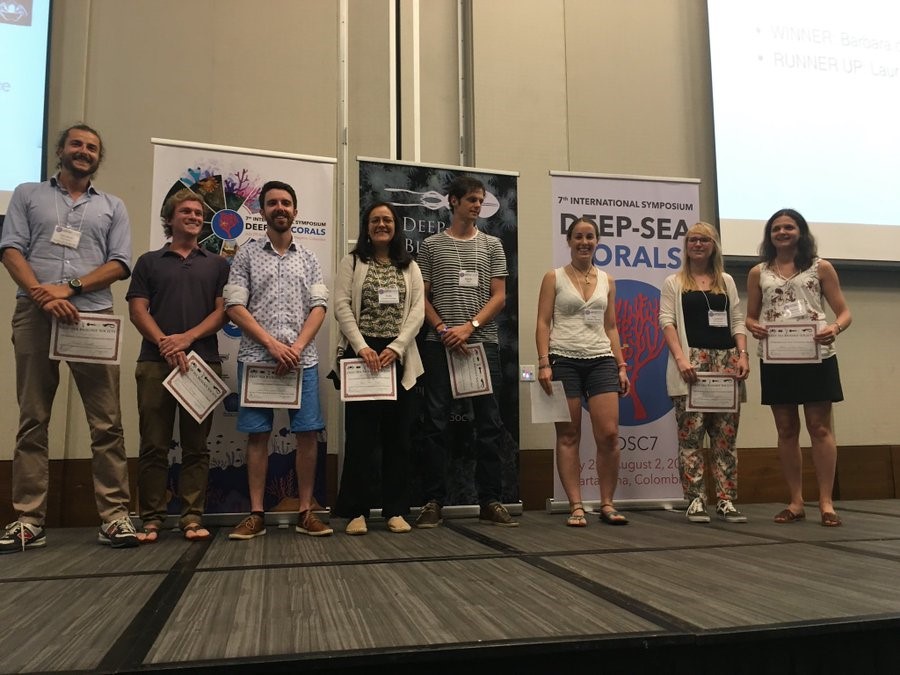
Lounsbery Workshop Award
ISDSC7 was followed up by a Deep-Sea Coral Taxonomy Workshop in December 2-4 at the Makuriwa Museum in INVEMAR, Santa Marta, Colombia. The workshop was led by Luisa Dueñas and Cristina Cedeño, and supported by the Lounsbery Workshop Award from the society. The workshop was mainly a hands-on experience, focused on the study of octocorals and black corals, with the participation of Phil Alderslade (CSIRO, Australia), Tina Molodtsova (P.P. Shirshov Institute of Oceanology RAS, Russia), Odalisca Breedy (Universidad de Costa Rica, Costa Rica), and Juan A. Sánchez (Universidad de Los Andes), as international taxonomic experts. They workshop had 24 participants from 9 countries, including the 4 international expert deep-sea coral taxonomists. Participants included undergraduate students, graduate students, and early-career researchers. This workshop provided a unique opportunity to train the next generation of deep-sea coral taxonomists, build local taxonomic capacity in Colombia and Latin America broadly, and advance in the knowledge of deep-sea coral biodiversity in the Caribbean region through the identification of dozens of museum specimens, some of which will be described as new species.
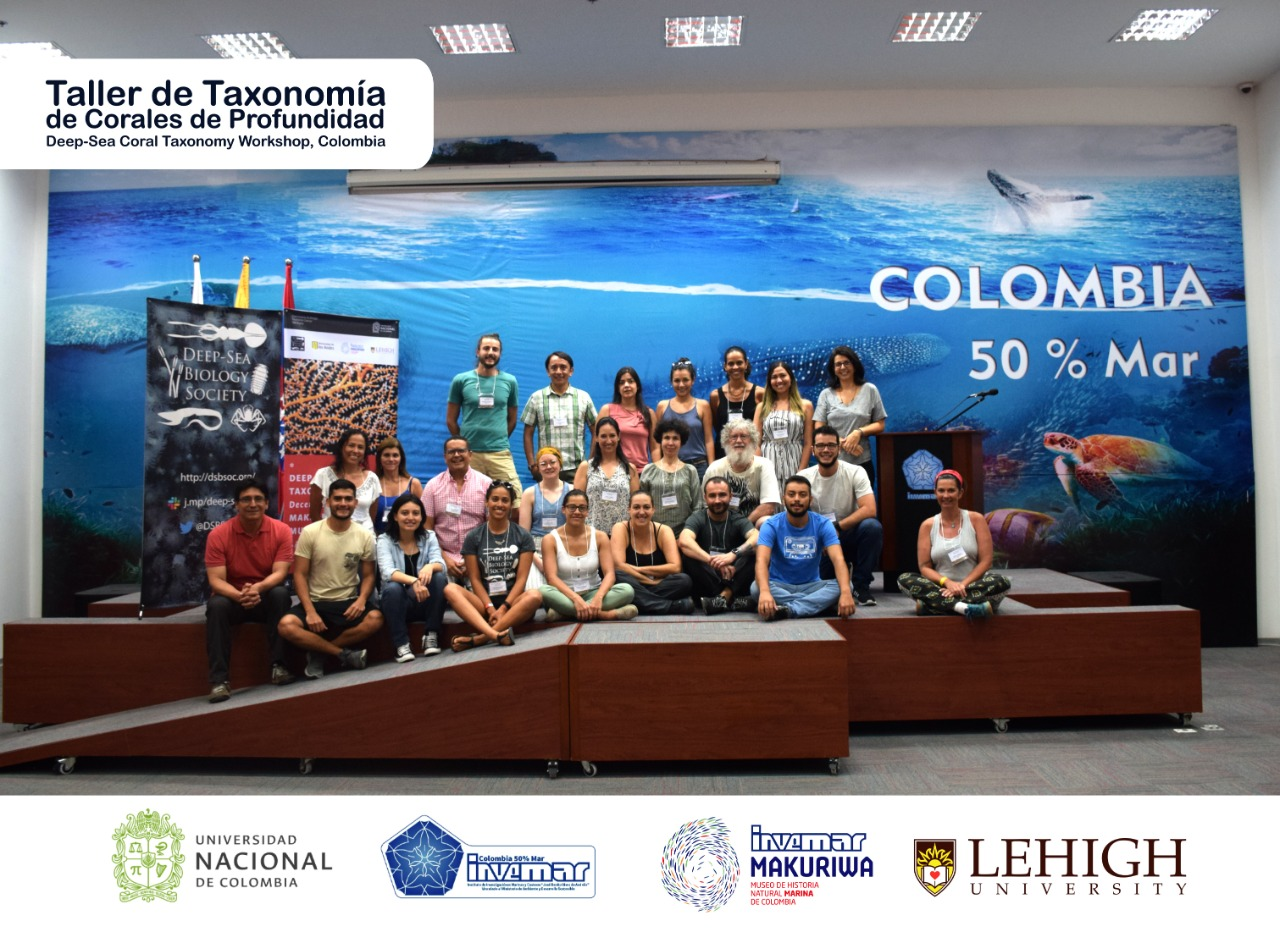
Forthcoming Calls in 2020
We are pleased to announce a new award, which will enable researchers to apply for funds to join a research expedition. More details will follow soon.
In the coming year we will also have the following awards open for applications:
- Paper of the Year
- Dive Deeper (2 bursaries)
- Travel awards for the 7th Chemosynthetic Ecosystems Conference to be held in Guaruji, Brazil (August 2020). We will also be awarding prizes for the best presentations at this conference.
All terms and conditions for our awards can be found on our website here: https://dsbsoc.org/grants-awards/society-awards/
Deep-Sea Biology Society Students
Zoleka Filander, Student Officer, students@dsbsoc.org
This year’s student mixer event, hosted at the 7th International Symposium on Deep-Sea Corals (29 July – 2 August, Colombia), exemplifies the continuous efforts of the Society to support students at meetings that align with Deep-Sea Research. The event itself took a more casual and interactive approach, ensuring students get to hear the experiences of experts within the field of Deep-Sea Coral research. The 29 student participants had the opportunity to gain valuable insights from ten experts within academia and the public sector. Another student event is planned to take place at the 7th Chemosynthetic-Based Ecosystem meeting in Brazil (2020), and aims to align the interests of students with those of post-doctoral fellows.
In addition to these support orientated activities, the Society further participated at the Western Indian Ocean Early Career Scientists Network (WIO-ECSN) special session ( 5th July, Mauritius), in order to evaluate the number of active deep-sea researchers (if any) in the region. An invite to attend this meeting was leveraged through existing relations of the Deep-Sea Society student representative with WIO-ECSN, and aimed to increase membership in under-represented region (one of which is the Western Indian Ocean).
Student opportunities are still being communicated through the students mailing list. New developments include; the launch of showcasing student research on the Deep-Sea Biology Society website, in order to (i) promote networking within student members and non-members (ii) demonstrate the diversity of research and skills developed within the field (iii) initiate future collaborations within student researchers within the field. This development was initiated through a collaborative effort between the Society’s Student Representative and Communications Officer, which we hope to trial for a year.
If you have any suggestions on how the Society can better support students, please contact the student officer on students@dsbsoc.org
Deep-Sea Biology Society Early-Career Support
Andrea Quattrini, Early Career Officer, early_career@dsbsoc.org
An early-career webinar series was established this year. So far we have had three webinars focusing on: 1) Time management and work-life balance, 2) Effective broader impacts and outreach and 3) Academic job preparation. Several senior and early career scientists provided advice on the above topics during 1-2 hour discussions. We thank everyone for their participation! Tips for academic job preparation with example statements are available on request from the Early Career Officer. Next up is a webinar on effective proposal writing, TBA soon, and a plan for 2020 activities will follow.
Other activities included a well-attended Early Career Mixer event during the ISDSC7 in Colombia.
Deep-Sea Biology Society Mentoring
Rachel Jeffreys, Awards Officer, awards@dsbsoc.org
The mentoring mentoring network was set up as a space to provide advice and support for both graduate and early career researchers. It consists of groups of scientists at various stages in their careers, from graduate scientists to professors. The groups meet every 4-8 weeks via an online platform and discuss a variety of topics including but not limited to: paper writing, work-life balance, job applications and career progression.
I am delighted to announce that after a successful year piloting the mentoring network with three groups we have now progressed to 11 groups with ~80 scientists. These groups have been in place since the summer and I hope that you are all finding the network useful. If you are interested in joining the network please do get in touch. Similarly if you already participate in the network and have any suggestions or ideas please let me know.
Deep-Sea Biology Society Communications
Paris Stefanoudis, Communications Officer, communications@dsbsoc.org
If you have not been able to attend the very successful ISDSC7 in Colombia earlier this year, you can find more about it by browsing the travel award reports from Society members. These travel grants were awarded to researchers from all career levels in order to help them present their work there. You can read the travel award reports here.
We have been continuously updating the Society’s website and social media with content derived from Deep-Sea Life 13, as part of the integration of the communication aspects of the Deep-Sea Biology Society, INDEEP and DOSI, and will continue to do so over the next six months with content from the current Deep-Sea Life issue. You can see some examples on our website using the tag “Deep-Sea Life”. You can also access all previous Deep-Sea Life issues on the Society’s website and of course on the INDEEP website.
We are witnessing a continuous growth on our Twitter account, which now stands at well over 5,000 followers, up ~60% from this point last year. We are committed to strengthen our social media presence in the coming months even more, so as to ensure that we stay connected with the growing community of deep-sea biologists around the world. You can follow us here.
Finally, if you want us to spread the word about upcoming events, courses, new papers etc. that will be of interest to the wider deep-sea biology community please direct message us on our Twitter Account or contact our Communications Officer at communications@dsbsoc.org.
Deep-Sea Biology Society Membership
Santiago Herrera, Memberships Officer, membership@dsbsoc.org
Current membership levels are double what they were this same time of the year two years ago. This is a strong indicator that the society continues to grow at a healthy pace. As membership grows, the services that the society offers to the community also increase in number and scope.
Deep-Sea Biology Society Finances
Chris Yesson, Treasurer, treasurer@dsbsoc.org
The society has filed its first set of accounts with the UK Charity Commission, covering the period of July 2017 until December 2018. Accounts available at https://tinyurl.com/tnwrjyj. Moving forwards the society will file in sync with the calendar year, but for these first accounts we were required to cover the period from our official charity registration in July 2017.
Membership income for 2019 remains solid, although is down from the 2018 high that was driven by the registrations (including membership option) for the 15th Deep-Sea Biology Symposium. Membership income remains our main regular income stream that enables the Society to carry out its core activities. Our grant from the Lounsbery Foundation comes to an end in 2019, this has been used to fund travel, dive-deeper awards and workshop awards. The Society earned a modest profit from supporting ISDSC7. The society took on the up-front costs of venue hire, and we used our payment platform to handle registrations. The Society’s support enabled us to fund extra travel awards and funded mentoring and student events at the conference. This was a successful pilot that could be a model for future conference support from the society.

